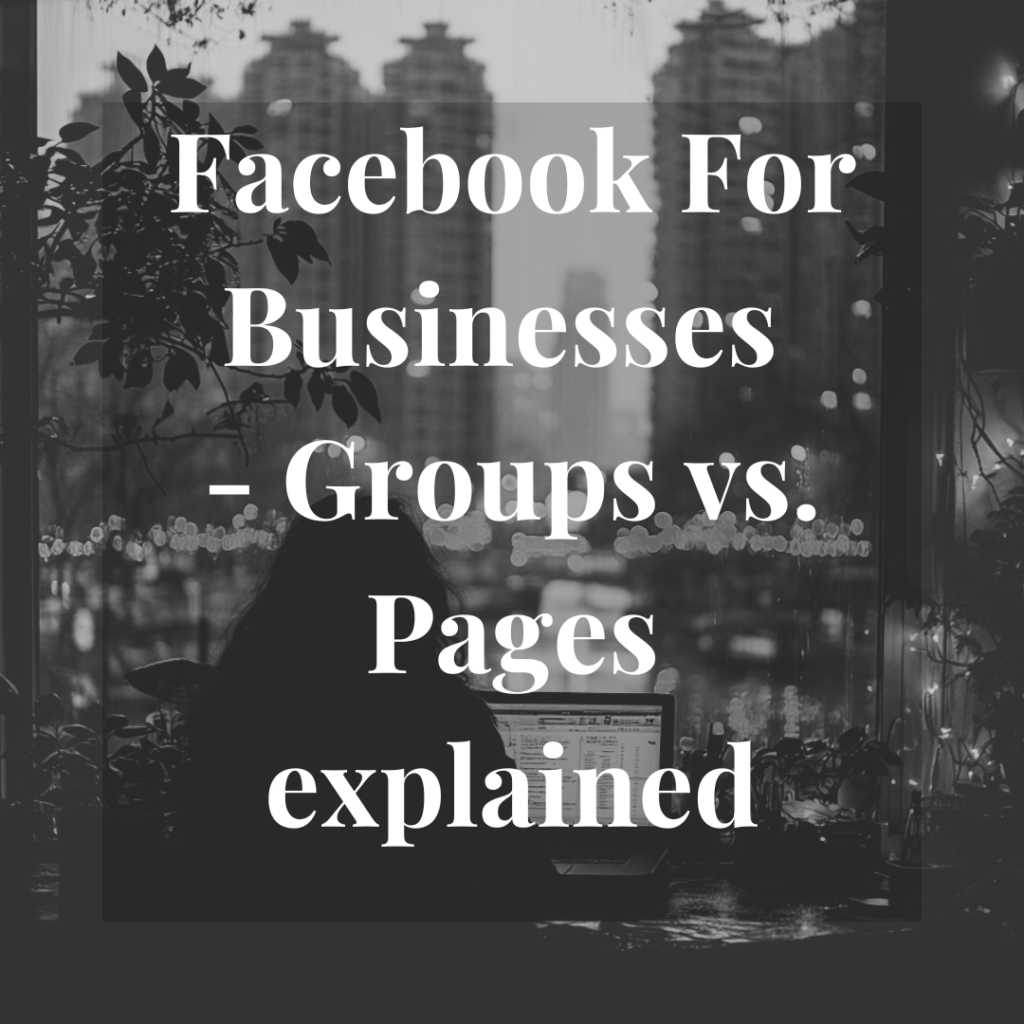
Facebook Group vs. Facebook Page: Which is Best for Your Blogging Business?
If you’re running a blogging business like me (or any business you’re starting from the ground up for that matter!) and trying to figure out how best to leverage Facebook for growth, you’re probably wondering if you should you start with a Facebook Page or a Facebook Group?
Let’s dig in to the pros and cons of each.
Facebook Page: Your Business’s Front Door
A Facebook Page acts as your business’s public face on Facebook. It’s like an online business card mixed with a bulletin board, where anyone on Facebook can find you, learn about your blog, and follow your updates.
Pros of a Facebook Page
- Public Visibility: Facebook Pages are public, which means anyone can find and follow you. This visibility is crucial for search engine optimization (SEO) and brand recognition. A well-maintained Facebook Page can appear in Google search results, bringing more traffic to your blog.
- Professionalism: A Facebook Page lends an air of legitimacy to your business. When people search for your blog or your name, a professional-looking Page reassures them that you’re serious about your work.
- Analytics and Insights: Facebook Pages come with built-in analytics tools that let you track engagement, page views, and more. This data is invaluable for understanding your audience and refining your content strategy.
- Advertising Capabilities: Facebook Pages allow you to run ads, which can be highly effective in driving traffic to your blog, promoting posts, or growing your audience. Facebook’s ad platform is sophisticated, offering you the ability to target specific demographics with precision.
- Content Scheduling: Pages allow for easy scheduling of posts, meaning you can plan out your content in advance, ensuring a steady stream of updates without constant manual posting.

Cons of a Facebook Page
- Organic Reach Decline: In recent years, organic reach for Facebook Pages has declined. With more businesses vying for attention, Facebook has adjusted its algorithm to prioritize content from friends and groups over pages. This means your posts may not reach as many people unless you boost them with paid advertising.
- Limited Interaction: While you can engage with your followers through comments and messages, interaction on a Facebook Page is generally more one-sided. Followers see what you post, but there’s less of a community feel compared to a Facebook Group.
- Algorithm Dependency: Your content’s visibility heavily depends on Facebook’s algorithm. Unless you’re posting content that consistently drives high engagement, your updates might get lost in the noise of users’ feeds.

Facebook Group: Building a Community
On the other hand, a Facebook Group fosters a sense of community and allows for more direct and personal interaction with your audience. Groups are designed for discussions and engagement, making them ideal for building a loyal following.
Pros of a Facebook Group
- Community Building: Facebook Groups are all about interaction. Members can post, comment, and engage with each other, creating a community around your blog. This can lead to a more dedicated following who feel personally connected to your brand.
- Higher Engagement: Posts in Facebook Groups tend to get more engagement than those on a Page. Members are more likely to see and interact with your content because the group environment fosters discussion and participation.
- Content Control: You can control the type of content posted within your group, creating a focused environment. For example, you can set rules about self-promotion or require admin approval for posts, ensuring that the group stays on-topic and valuable for all members.
- Exclusive Content: Groups are perfect for offering exclusive content, such as live Q&A sessions, webinars, or course discussions. This can be a great incentive for your blog followers to join the group and stay engaged.
- Algorithm Advantage: While Pages struggle with declining organic reach, Facebook Groups tend to be favored by the algorithm, meaning your posts are more likely to appear in members’ feeds.

Cons of a Facebook Group
- Time-Consuming: Managing a Facebook Group requires more time and effort than a Page. You need to moderate discussions, post regularly, and engage with members to keep the group active and valuable.
- Limited Analytics: Unlike Facebook Pages, Groups offer fewer insights into member behavior and engagement. While you can see basic statistics like post reach and member count, you won’t get the detailed analytics available for Pages.
- Privacy Concerns: If your group is set to private, it won’t be visible in search engines, limiting its discoverability. Conversely, if it’s public, you might need to deal with spam or irrelevant posts, requiring more active moderation.
- No Advertising: Facebook doesn’t allow you to run ads within Groups. This limits your ability to use paid promotions to grow your group, unlike a Facebook Page where ads can play a significant role in growth.
When to Use a Facebook Page
For most blogging businesses, especially when you’re just starting out, a Facebook Page should be your first step. Here’s why:
- Branding: A Facebook Page helps establish your brand on a professional level. It’s a public platform where anyone interested in your blog can find and follow you.
- SEO Benefits: As mentioned earlier, Facebook Pages are indexed by search engines, which can help improve your blog’s search visibility.
- Advertising and Growth: If you plan to use Facebook ads to grow your blog, you’ll need a Facebook Page. The platform’s advertising tools are powerful, and running targeted ads can be a quick way to build an audience.
- Content Management: With a Page, you can schedule posts and easily manage your content. This allows you to keep your audience engaged with minimal daily effort, freeing you up to focus on creating great content for your blog.

When to Add a Facebook Group
Once you’ve built a decent following on your Facebook Page and your blog, it might be time to consider starting a Facebook Group. Here’s when a Group makes sense:
- Building a Community: If you have a core group of followers who are highly engaged with your content, a Facebook Group can help turn that engagement into a community. This is particularly valuable if you’re offering online courses, exclusive content, or want to create a space for in-depth discussions.
- Exclusive Content: When you’re ready to offer exclusive content like live sessions, behind-the-scenes insights, or in-depth Q&A sessions, a Facebook Group is the perfect platform. You can position it as a special perk for your most dedicated followers.
- Higher Engagement: If you’re struggling with engagement on your Facebook Page, creating a Group can provide a more interactive platform where your audience feels more involved and valued.
- Feedback and Insight: Groups are great for getting direct feedback from your audience. You can ask questions, conduct polls, and get a real sense of what your community wants from your blog.
Conclusion: Start with a Facebook Page, Grow with a Group
So just start simple. Launch your Facebook Page, focus on growing your audience, and only then consider adding a Facebook Group to deepen engagement and create a community around your brand. This allows you to leverage the strengths of both tools, ensuring that your blogging business thrives on Facebook and beyond!
[ad] Resources
This book has all the nitty gritty details of your ideal social media strategies for your business if you’re interested in learning more but don’t want to spend the kind of money that the marketing courses aimed at bloggers tend to cost. [ad] Link to purchase below:

Share
As always I’d love to hear from you – let me know in the comments below how your social media strategy for your business is coming along!






